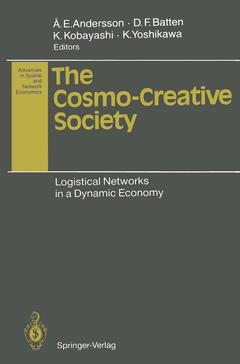Description
The Cosmo-Creative Society, Softcover reprint of the original 1st ed. 1993
Logistical Networks in a Dynamic Economy
Coll. Advances in Spatial and Network Economics
Language: French
Subjects for The Cosmo-Creative Society:
Publication date: 01-2012
296 p. · 15.5x23.5 cm · Paperback
296 p. · 15.5x23.5 cm · Paperback
Description
/li>Contents
/li>
Today, telecommunication systems are expanding and evolving at a remarkable rate, with the aid of fiber optics, satellites and comput erized switchboard systems. Airline systems are providing faster and more efficient networks for world-wide human transportation. Com puters are now generally accessible to virtually all industries and many households. But perhaps the most important factor is that education systems are expanding the knowledge base for city populations, thus resulting in increased efficiency in the use of computers, telecommuni cations and rapid transportation systems. The revolutionary age of logistical networks is upon lIS. Logistical networks are those systems which facilitate the movement of knowl edge, commodities, money, and people in association with thE; produc tion or consumption of goods and services. Logistical networks form a set of important infrastructure which serve as hard and soft means to sustain all kinds of movement, transactions and diffusion within and between global networks of cities. Major structural changes in the re gional and urban economy, culture and institutions are triggered by slow but steady changes in global logistical systems.
1. Logistical Dynamics, Creativity and Infrastructure.- I. Cosmo-Creativity in the Knowledge Society.- 2. Economic Structure of the 21st Century.- 3. The Creative Person.- 4. Synergetics as a Theory of Creativity and Its Planning.- 5. High Technology Worker Mobility.- II. Logistical Network and Chaotic Dynamics.- 6. Some Consequences of ‘Recurrence and Expansion’: What Can We Learn about Logistical Networks from Chaos?.- 7. The Complexity of Economic Decisions — Anticipatory Human Behavior.- 8. Incomplete Information and Logistical Network Equilibria.- III. Network Dynamics with Cosmo-Creativity.- 9. Entrepreneurship in the New Technological Regime.- 10. Network Cities versus Central Place Cities: Building a Cosmo-Creative Constellation.- 11. Economic Evolution and Urban Infrastructure Dynamics.- IV. Infrastructure for the Cosmo-Creative Society.- 12. Information Technology and Urban Spatial Structure.- 13. Impacts of Developments in Telecommunication Systems on Travel Demand and the Location of Office Firms.- 14. Spatial Equilibria of Knowledge Production with ‘ M ?? ting- Facilities’.- 15. Dynamic Change of Urban Housing Stock, Construction and Demolition.- 16. Optimal Regional Investment Control Using Hallmark Events.- V. Planning and Policy Perspectives.- 17. Creative Renaissance of the Osaka Bay Area — Towards a Cosmo-Creative Region in the 21st Century.- List of Contributors.
© 2024 LAVOISIER S.A.S.




